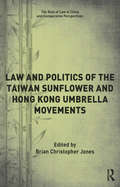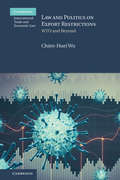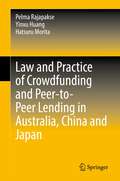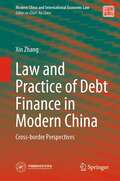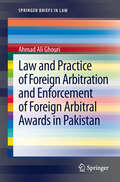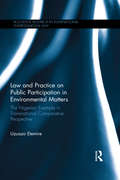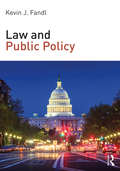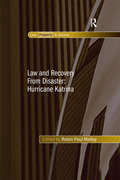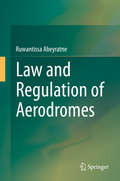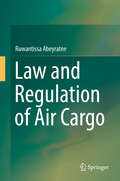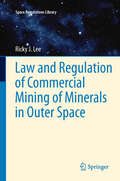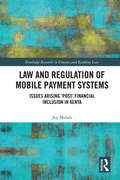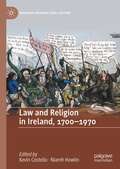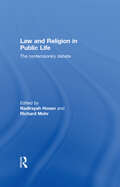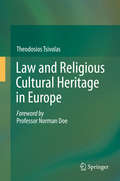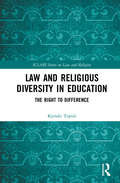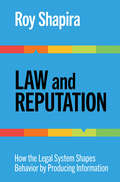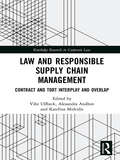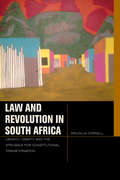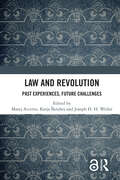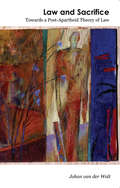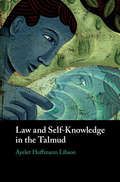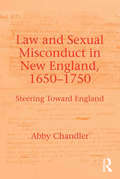- Table View
- List View
Law and Politics of the Taiwan Sunflower and Hong Kong Umbrella Movements (The Rule of Law in China and Comparative Perspectives)
by Brian Christopher JonesRarely do acts of civil disobedience come in such grand fashion as Taiwan’s Sunflower Movement and Hong Kong’s Umbrella Movement. The two protests came in regions and jurisdictions that many have underestimated as regards furthering notions of political speech, democratisation, and testing the limits of authority. This book breaks down these two movements and explores their complex legal and political significance. The collection brings together some of Asia’s, and especially Taiwan and Hong Kong’s, most prolific writers, many of whom are internationally recognised experts in their respective fields, to address the legal and political significance of both movements, including the complex questions they posed as regards democracy, rule of law, authority, and freedom of speech. Given that occupational type protests have become a prominent method for protesters to make their cases to both citizens and governments, exploring the legalities of these significant protests and establishing best practices will be important to future movements, wherever they may transpire. With this in mind, the book does not stop at implications for Taiwan and Hong Kong, but talks about its subject matter from a comparative, international perspective.
Law and Politics on Export Restrictions: WTO and Beyond (Cambridge International Trade and Economic Law)
by Chien-Huei WuDelving into export restrictive measures this book links the key areas of WTO law, public international law, investment and competition law to expose how and why WTO rules on export dimension are insufficient due to export bias; how public international law helps to justify their adoption or maintenance; and how investment and competition laws contribute to their regulation. Built on works on accession protocols and national security exceptions, this book goes beyond international trade law and looks into international political economy, competition and investment law. It contributes to debates in conceptualising public and private forms of export restrictions, appreciating the complementary nature of trade and competition law in disciplining them; capturing the dynamic between trade and investment policies for their effectuation and circumvention; and bridging trade law and public international law to better understand their impositions for political and diplomatic purposes with the invocation of the national security justification.
Law and Practice of Crowdfunding and Peer-to-Peer Lending in Australia, China and Japan
by Pelma Rajapakse Yinxu Huang Hatsuru MoritaThe revolution in financial technology (FinTech) has created many advancements in the lending and investment space across the world. Law and Practice of Crowdfunding and Peer-to-Peer Lending in Australia, China, and Japan is a timely publication as FinTech grows up and moved into the mainstream of finance in the last decade. Financial services is a highly regulated industry as it is the lifeblood of a modern economy. Pelma Rajapakse, Hatsuru Morita, and Yinxu Huang have done very solid work blazing a new trail in what is a new industry and how to regulate it properly instead of stifling innovation. They have carried out a deep exploration and a thorough compilation of research that will bring everyone up to date on what Australia, China, and Japan are planning and doing in the field of crowdfunding and peer-to-peer lending. In addition to peer-to-peer lending, the book focuses on laws and practices related to Central Bank digital currencies, cryptocurrency, Bitcoin, and Initial Coin Offerings (ICOs) which is very meaningful and forward-looking. The authors presented their thoughts in such clarity that, even those who lack familiarity with Asia-Pacific, will see how FinTech was growing in various ways driven by different factors. For example, peer-to-peer lending in Japan is mostly for small and medium enterprises. It was popular in China but cracked down by the authorities for a few years. It provides an alternative fundraising channel for the capital market in Australia. We also see a set of regulatory approaches among jurisdictions. Some countries draft new regulations, while others amend existing laws. The mechanism of the regulatory sandbox was introduced. As we know, one size does not fit all. What kind of best practices or lessons learned can we apply to our own jurisdiction? This book covers all available answers to date. This volume speaks highly of the quality and foresight of Pelma Rajapakse and her co-authors.
Law and Practice of Debt Finance in Modern China: Cross-border Perspectives (Modern China and International Economic Law)
by Xin ZhangThis book provides updated, full-picture analysis of the laws and practices of cross-border debt finance in the PRC. It is featured by the first-handed experiences of the author’s academic research and legal practice in this field over two decades. The author discusses legal and regulatory issues, transaction structures and documentation in relation to two debt finance products: loan and bond, covering the inbound structure (Chinese debtors’ raising funds from the international market) and the outbound structure (Chinese creditors’ supplying funds to the international market). For cross-border loans, this book thoroughly illustrates the foreign debt regulatory regime in the PRC and approaches the lending by Chinese banks to support exports and overseas investments under the “Belt and Road Initiative” (BRI). For cross-border bonds, it discusses how Chinese issuers, by designing various transaction structures, enter into the international bond market, and then researches the “opening-up” of Chinese bond market to both international issuers (for issuing “Panda Bonds”) and investors (for purchasing Chinese bonds). This book is used as an authoritative source for not only students and researchers, but also bankers and legal practitioners, who are interested in the Chinese debt finance market.
Law and Practice of Foreign Arbitration and Enforcement of Foreign Arbitral Awards in Pakistan
by Ahmad Ali GhouriPakistan has recently reformed its arbitration laws and laws on the recognition and enforcement of foreign arbitration agreements and awards. These reforms relate to both international commercial and investment arbitration. This book highlights the changes brought about by the recent enactments and explains the relationships between the old and new legislation. It provides a detailed and up-to-date analysis of Pakistani case law on foreign arbitration agreements and awards. Part I describes the background of arbitration laws in Pakistan. Part II explains the applicable substantive and procedural rules for the recognition and enforcement of foreign arbitration agreements and awards and other important issues, such as the severability of arbitration clauses from main agreements, questions of public policy, and interim measures supporting foreign arbitration. Part III analyses the recent enactments that implement the New York and the ICSID Conventions in Pakistan.
Law and Practice of Liability Management
by Apostolos Ath. GkoutzinisTender offers, exchange offers and consent solicitations in connection with debt securities are important instruments of corporate restructurings, corporate rescues, recapitalisations and other types of liability management of public and private companies. Although tender offers for shares, stocks and other equity securities are covered by a vast literature on public mergers, takeovers and acquisitions, the literature on liability management transactions for debt securities is scarce. Law and Practice of Liability Management rectifies this by providing a systematic treatise of the law relating to this significant aspect of the global capital market. It guides students and professionals through the complex legal and regulatory requirements applicable to these transactions, the increasing regulatory interest by the world's leading financial regulatory authorities, and recent innovations in the structuring, legal techniques and execution of the relevant transactions in international capital markets.
Law and Practice on Public Participation in Environmental Matters: The Nigerian Example in Transnational Comparative Perspective (Routledge Research in International Environmental Law)
by Uzuazo EtemirePublic participation has become a recurring theme and a topical issue in the field of international environmental law, with many multilateral environmental instruments calling on states to guarantee effectively the concept in their laws and practices. This book focuses on public participation in environmental governance, in terms of public access to environmental information and public participation in environmental decision-making processes. Drawing on the body of international best practice principles in environmental law and taking a comparative stance, Uzuazo Etemire takes Nigeria as a key case, evaluating its procedural laws and practices in relation to public access to information and participation in decision-making in environmental matters. In working to clarify and deepen understanding of the current status of environmental public participation rights in Nigeria, the book addresses key issues in environmental governance for developing and transitional countries and the potential for public participation to improve the state of the environment and public wellbeing. This book will be of great interest to undergraduate students (as further reading) and post-graduate students, academics, researchers, relevant government agencies and departments, policy-makers and NGOs in the fields of international environmental law, environmental justice, environmental/natural resource management, development studies and international finance.
Law and Public Policy
by Kevin J. FandlLaws exist to incentivize us to act in a certain manner, in accordance with the policies that our community has deemed right for us. And when we disagree with those laws, we must re-examine our policies, and thus our beliefs and ideas, to decide whether our community has changed. This is a book about law and public policy—about the ideas and the rules we build to implement those rules. While similar books have looked at public policy and public administration in an effort to explain how the government works, and others have considered the foundations of the legal system to understand the rulemaking institutions, this book takes a different approach. In this ground-breaking new textbook, author Kevin Fandl develops a complete picture of society, from idea to action -- by examining laws through the lens of policy, and vice versa. This holistic approach gives readers a chance to see not only why certain rules exist, but how those rules evolved over time and the events that inspired them. It offers readers an opportunity not only to see but also to participate in the process of forming the structures that shape our society. This textbook is divided into two sections. The first section provides readers with the tools that they will need to digest the policies and laws that surround them. These tools include a historical deep dive into the foundations of the governance structure in the United States and beyond, an important examination of civics and a reminder of the importance of engaging in the policymaking process, a careful breakdown of the institutions that form the backbone of the law and policy-making institutions in the United States, and finally critical thinking including practical tools to find reliable sources for news, research, and other types of information. The second section of the text is comprised of subject-matter analyses. These subject-based chapters, written by experts on the topic at hand begin with a historical perspective, followed by a careful examination of the key policies and laws that inform that field. Each chapter highlights key vocabulary, provides practical vignettes to add context to the writing, explores a unique global component to compare perspectives from communities worldwide, and includes a number of discussion questions and recommended readings for further examination. This textbook is tailored specifically for undergraduate and graduate students of public policy, to introduce them to the role of law and legal institutions as facilitators and constraints on public policy, exploring those laws in a range of relevant policy contexts with the help of short case studies.
Law and Recovery From Disaster: Hurricane Katrina (Law, Property and Society)
by Robin Paul MalloyIn August of 2005, Hurricane Katrina hit the Gulf Coast of the United States, directly affecting 1.5 million people. Only one year earlier, an Indian Ocean tsunami struck Indonesia, destroying or damaging more than 370,000 homes. As forces of nature, hurricanes, tsunamis, earthquakes and floods are not limited to occurrences in any one community or any one country. In Law and Recovery from Disaster: Hurricane Katrina, attention is focused on the ability of law and legal institutions to not only survive such disasters but to effectively facilitate recovery. Using Hurricane Katrina as a lens, contributors address a wide range of issues of interest to people concerned about property law, disaster preparedness, housing, insurance, small business recovery, land use planning and the needs of people with disabilities. While Hurricane Katrina is the focal point for discussion, the lessons learned are readily applicable to a variety of disaster situations in a wide range of global settings.
Law and Regulation of Aerodromes
by Ruwantissa AbeyratneThis book encapsulates in detail the principles pertaining to legal and regulatory aspects of aerodromes. As the title denotes, it discusses the various aspects of the structure and functioning of an aerodrome and the complexities involved. It focuses on the law and regulation of aerodrome certification and planning, aerodrome services, financial and economic planning, security, management and governance. The airport industry is one of the fastest growing within the aviation industry, requiring innovation and creativity in management. This in turn has called for an increased focus on advanced management programmes for airport managers and lawyers. The Airport Management Professional Accreditation Programme (AMPAP) offered worldwide by the International Civil Aviation Organization and Airports Council International, and the Angkasa Pura II Airport Management Excellence Programme of Indonesia are two such initiatives which give airport professionals a sound grounding on the principles and techniques of management and law.
Law and Regulation of Air Cargo
by Ruwantissa AbeyratneThis book explores the legal and regulatory aspects of the complex air cargo sector, discussing in detail the general principles of the carriage of air cargo; artificial intelligence and air cargo; facilitation; carriage of hazardous goods; human remains; and animals, as well as cargo security; price fixing and anti competitive conduct in air cargo operations; liability issues; the air cargo supply chain and contract of carriage. It also discusses related achievements of the International Civil Aviation Organization; the International Air Transport Association and Airports Council International. The value of goods carried by airlines represents 7.4% of the global Gross Domestic Product. While cargo carried by air accounts for less than 1% of global cargo carriage, airlines carry 35% of the value of world trade, making this industry highly valuable and efficient, and the most reliable way to transport goods throughout the world. On average, airlines transport 52 million metric tons of goods per annum, worth an equivalent of $6.8 trillion, i.e. $18.6 billion worth of goods daily.
Law and Regulation of Commercial Mining of Minerals in Outer Space
by Ricky LeeThis monograph addresses the legal and policy issues relating to the commercial exploitation of natural resources in outer space. It begins by establishing the economic necessity and technical feasibility of space mining today, an estimate of the financial commitments required, followed by a risk analysis of a commercial mining venture in space, identifying the economic and legal risks. This leads to the recognition that the legal risks must be minimised to enable such projects to be financed. This is followed by a discussion of the principles of international space law, particularly dealing with state responsibility and international liability, as well as some of the issues arising from space mining activities. Much detail is devoted to the analysis of the content of the common heritage of mankind doctrine. The monograph then attempts to balance such interests in creating a legal and policy compromise to create a new regulatory regime.
Law and Regulation of Mobile Payment Systems: Issues arising ‘post’ financial inclusion in Kenya (Routledge Research in Finance and Banking Law)
by Joy MalalaOver the last ten years mobile payment systems have revolutionised banking in some countries in Africa. In Kenya the introduction of M-Pesa, a new financial services model, has transformed the banking and financial services industry. Giving the unbanked majority access to the financial services market it has attracted over 18 million subscribers which is remarkable given that fewer than 4 million people in Kenya have bank accounts. This book addresses the legal and regulatory issues arising out of the introduction of M-Pesa in Kenya and its drive towards financial inclusion. It considers the interaction between regulation and technological innovation with a particular focus on the regulatory tools, institutional arrangements and government decisional processes through the examination as a whole of its regulatory capacity. This is done with a view to understanding the regulatory capacity of Kenya in addressing the vulnerabilities presented by technological innovation in the financial industry for consumers after financial inclusion. It also examines the way that mobile payments have been regulated by criticising the piecemeal approach that the Central Bank of Kenya has taken in addressing the legal and regulatory issues presented by mobile payments. The book argues there are significant gaps in the regulatory regime of mobile banking in Kenya.
Law and Religion
by Stephen M. FeldmanFew issues arouse as much passionate debate as the relationship between church and state. Political parties and coalitions have long jockeyed for position in the battle to either keep the two separate, or to unify them in one nation indivisible from God. While the battle has been raging in the political arena, figures from academia, the media, and myriad other vantage points, have commented on the context and constitutionality of laws governing religious expression. In Law and Religion, Stephen M. Feldman brings together the many perspectives that have shaped policy on this important national issue. In giving voice to the political left and right, as well as to cultural, philosophical, sociological and historical perspectives, the book serves as an even-handed treatment of an issue all too often clouded by biases. Contributors ranging from Stanley Fish to Richard John Neuhaus explore issues extending from religious morality and religious freedom, to fundamentalism, the separation of church and state, religion and public schooling, and liberal political theory. Comprehensive in scope, Law and Religion will stand as an important reference for anyone seeking to further understand this complex and highly emotional topic.
Law and Religion in Ireland, 1700-1970 (Palgrave Modern Legal History)
by Kevin Costello Niamh HowlinThis book focuses, from a legal perspective, on a series of events which make up some of the principal episodes in the legal history of religion in Ireland: the anti-Catholic penal laws of the late seventeenth and early eighteenth century; the shift towards the removal of disabilities from Catholics and dissenters; the dis-establishment of the Church of Ireland; and the place of religion, and the Catholic Church, under the Constitutions of 1922 and 1937.
Law and Religion in Public Life: The Contemporary Debate
by Richard Mohr Nadirsyah HosenWith religion at centre stage in conflicts worldwide, and in social, ethical and geo-political debates, this book takes a timely look at relations between law and religion. To what extent can religion play a role in secular legal systems? How do peoples of various faiths live successfully by both secular laws as well as their religious laws? Are there limits to freedom of religion? These questions are related to legal deliberations and broader discussions around secularism, multiculturalism, immigration, settlement and security. The book is unique in bringing together leading scholars and respected religious leaders to examine legal, theoretical, historical and religious aspects of the most pressing social issues of our time. In addressing each other’s concerns, the authors ensure accessibility to interdisciplinary and non-specialist audiences: scholars and students in social sciences, human rights, theology and law, as well as a broader audience engaged in social, political and religious affairs. Five of the book’s thirteen chapters address specific contemporary issues in Australia, one of the most ethnically diverse countries in the world and a pioneer of multicultural policies. Australia is a revealing site for contemporary studies in a world afraid of immigration and terrorism. The other chapters deal with political, legal and ethical issues of global significance. In conclusion, the editors propose increasing dialogue with and between religions. Law may intervene in or guide such dialogue by defending the free exchange of religious ideas, by adjudicating disputes over them, or by promoting a civil society that negotiates, rather than litigates.
Law and Religious Cultural Heritage in Europe
by Theodosios TsivolasThis book examines in detail both historical and current legal concepts of 'religious cultural heritage' within the context of the European continent. The latter group is primarily based on the variety of sacred cultural elements emanating from the different religious traditions of the peoples of Europe, which are deemed worthy of protection and preservation due to their outstanding value, in terms of their social, cultural and religious significance. In view of this, the study provides evidence of the European States' active involvement with their sacred/cultural treasures, on the basis of the political and legal foundations of neutrality and pluralism. Furthermore, the book analyzes all relevant international legislative instruments (i. e. the plethora of EU, EC and UNESCO norms), as well as all major European legislative patterns, in light of their significance for the aforementioned aspects of pluralism and neutrality. The interdisciplinary references listed at the end of each chapter provide an additional incentive for further reading on the subject matter. The most important finding to emerge from the study is that there is a shared legal ethos in Europe that imposes a duty of appropriate care concerning the vast variety of sacred cultural goods and the religious cultural heritage in general, as an invaluable repository of European cultural capital. It also considers the sui generis nature of this capital: like any other type of asset, it may deteriorate or fade over time, necessitating investment in its preservation or refurbishment; nevertheless, like no other, this particular capital maintains a distinct cultural value, as it contains an additional characteristic of 'sacredness' expressed in the form of its 'religious character,' the latter being analyzed as a triptych of religious memory, religious aesthetics and religious beliefs.
Law and Religious Diversity in Education: The Right to Difference (ICLARS Series on Law and Religion)
by Kyriaki TopidiReligion is a prominent legal force despite the premise constructed and promoted by Western constitutionalism that it must be separated from the State in democracies. Education constitutes an area of human life that leaves ample scope for the expression of religious identity and shapes the citizens of the future. It is also the place of origin of a considerable number of normative conflicts involving religious identity that arise today in multicultural settings. The book deals with the interplay of law and religion in education through the versatility of religious law and legal pluralism, as well as religion’s possible adaptation and reconciliation with modernity, in order to consider and reflect on normative conflicts. It adopts the angle of the constitutional dimension of religion narrated in a comparative perspective and critically reflects on regulatory attempts by the State and the international community to promote new ways of living together.
Law and Reputation: How the Legal System Shapes Behavior by Producing Information
by Roy ShapiraThe legal system affects behavior not just directly, by imposing sanctions, but also indirectly, by producing information on how people behave. For example, internal company documents exposed during litigation will help third parties assess whether they trust a company and want to keep doing business with it. The law therefore affects behavior by shaping reputations. Drawing on economics, communications, and a nascent multidisciplinary literature on reputation, Roy Shapira highlights how reputation works, and how information from the courtroom affects the court of public opinion, with a particular emphasis on the role of the media. By fleshing out interactions between law and reputation, Shapira corrects common misperceptions about the ability of market forces to discipline corporate behavior and adds to timely, ongoing debates such as the desirability of heightened pleading standards or mandatory arbitration clauses. Law and Reputation should interest any scholar who invokes notions of market discipline in their work.
Law and Responsible Supply Chain Management: Contract and Tort Interplay and Overlap (Routledge Research in Corporate Law)
by Vibe Ulfbeck Alexandra Andhov Kateřina MitkidisCorporate Social Responsibility has for long been on the agenda in the business world and recently, it has also become a political agenda in the European Union. Focusing on international supply chains and their control based on studies of law in several European jurisdictions, this book aims to advance the discussion on the application and enforcement of CSR. Drawing parallels to US and Canadian law, the book explores to what extent private law tools can be used as an enforcement device and it ultimately asks if what we are witnessing is the formation of a new area of law, employing the interplay of contract and tort – a law of "production liability", as a corollary of the concept of "product liability".
Law and Revolution in South Africa: uBuntu, Dignity, and the Struggle for Constitutional Transformation (Just Ideas)
by Drucilla CornellThe relation between law and revolution is one of the most pressing questions of our time. As one country after another has faced the challenge that comes with the revolutionary overthrow of past dictatorships, how one reconstructs a new government is a burning issue.South Africa, after a long and bloody armed struggle and a series of militant uprisings, negotiated a settlement for a new government and remains an important example of what a substantive revolution might look like. The essays collected in this book address both the broader question of law and revolution and some of the specific issues of transformation in South Africa.
Law and Revolution: Past Experiences, Future Challenges
by Matej Accetto Katja Škrubej Joseph H. H. WeilerThe last one hundred years have seen a number of events that could be perceived as disruptive challenges to the normal operation of the legal order. Some have been disruptive innovations of technologies or business practices, others social changes or constitutional transformations, further buttressed by the impact of globalisation and interdependence affecting the development of international, transnational and global law. Coincidentally, this period of one hundred years has been bookended by two pandemics, themselves disruptive realities testing the resilience as well as the adaptability of the legal regimes. A hundred years ago, the founding dean of a newly established law faculty beginning its mission amid the ashes of the First World War and the disintegration of the only remaining European empire gave an opening lecture exploring the role of law and judges in the face of revolutionary societal changes. Drawing upon that important text, this edited volume explores similar challenges for law brought about by various disruptive realities. The collection looks at the past as well as the future. Following the text of the opening lecture by Pitamic, the contributions are grouped under five headings, dealing with the law and revolution in 1918, the challenges posed for law by the seemingly more gradual political or technological transformations, the effects of globalisation and the changing world, with the final contributions reassessing the law, its methodologies and traditional paradigms including, in the epilogue, the challenges posed for law the recent disruptive reality of the Covid-19 pandemic. The book will be of interest to academics, researchers and policy-makers working in the areas of legal history, jurisprudence, constitutional law, law and politics, and law and technology.The Open Access version of this book, available at http://www.taylorfrancis.com, has been made available under a Creative Commons Attribution-Non Commercial-No Derivatives (CC-BY-NC-ND) 4.0 license.
Law and Sacrifice: Towards a Post Apartheid Theory of Law (Birkbeck Law Press)
by John Willem Gous van der WaltIn the wake of apartheid, Law and Sacrifice draws on the uniquely expansive protection of fundamental rights now entrenched in the South African Constitution to outline a new theory of law. The South African Constitution not only protects the rights of people against abuses of power by the state, but also against abuses of power by private legal subjects. Drawing upon the work of contemporary thinkers such as Martin Heidegger, Hannah Arendt, George Bataille, Jacques Derrida Emmanuel Levinas and Jean-Luc Nancy, the author elicits the radical democratic potential of this 'horizontal' notion of rights. Johan van der Walt argues that apartheid must be understood as more than a racist abuse of power, and here he articulates its 'sacrificial logic'. It is in going beyond this logic, he maintains, that the truly democratic potential of the South African Constitution can be understood: in a radical formal and substantive equality that offers the legal basis for rethinking a post-apartheid future. Combining a rigorous theoretical understanding with a subtle political engagement, Law and Sacrifice is a dazzling interrogation of the limits and possibilities of democratic pluralism. It will be of interest to political and legal theorists as well as to those who are concerned with South African law and politics.
Law and Self-Knowledge in the Talmud
by Ayelet Hoffmann LibsonThis book examines the emergence of self-knowledge as a determining legal consideration among the rabbis of Late Antiquity, from the third to the seventh centuries CE. <P><P>Based on close readings of rabbinic texts from Palestine and Babylonia, Ayelet Hoffmann Libson highlights a unique and surprising developing in Talmudic jurisprudence, whereby legal decision-making incorporated personal and subjective information. She examines the central legal role accorded to individuals' knowledge of their bodies and mental states in areas of law as diverse as purity laws, family law and the laws of Sabbath. By focusing on subjectivity and self-reflection, the Babylonian rabbis transformed earlier legal practices in a way that cohered with the cultural concerns of other religious groups in Late Antiquity. They developed sophisticated ideas about the inner self and incorporated these notions into their distinctive discourse of law.<P> Uses a philosophical lens to explore rabbinic literature.<P> Accessibly written.<P> Weaves together legal and narrative sources.
Law and Sexual Misconduct in New England, 1650-1750: Steering Toward England
by Abby ChandlerHaving arriving in the Province of Maine in 1641 with a brief to create both government and law for the fledgling colony, Thomas Gorges later recorded his policy as having ’steared as neere as we could to the course of Ingland’. Over the course of the next century the various colonial administrations all consciously measured their laws against that of England, whether their intention was imitation of or conscious opposition to, established English legal system. In order to trace the shifting and contested relationships between colonial laws and English laws, this book focuses on the prosecution of sexual misconduct. All crimes can threaten orderly society but no other crime posed quite the same long term implications as illicit sex resulting in the birth of illegitimate children who became their own social challenges. Sexual misconduct was, consequently, a major concern for early modern leaders, making it a particularly fruitful subject for studying the complex relationship between laws in England and laws in the English colonies. Political and ecclesiastical leaders create laws to coerce people to behave in a certain fashion and to convey wider messages about the societies they govern. When those same laws are broken, lawbreakers must be tried and punished by a means intended to serve as a warning to other would-be lawbreakers. In this book the two-part analysis of changing sexual misconduct laws and the resulting trial depositions highlights the ways in which ordinary New England colonists across New England both interacted with and responded to the growing Anglicization of their legal systems and makes the argument that these men and women saw themselves as taking part in a much larger process.
